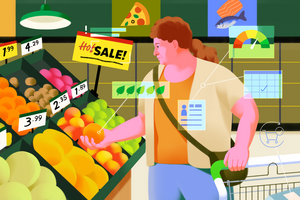Marketing Jul 11, 2018
How Well Do You Understand Digital Advertising?
Test your knowledge and see how it compares to the experts’.

Yevgenia Nayberg
You’ve surely noticed that digital marketing has become more sophisticated. Maybe you can recall a pair of shoes that seemed to follow you around the web for weeks. Or perhaps, just days after adopting a puppy, ads for organic dog food popped up in your social-media feeds.
But how effective are these ads really? And, should you care to, can you get them to stop? We have gathered a list of common perceptions—or misperceptions—about the industry and asked a pair of experts to tease them apart: Which are true and which are false?
Take the quiz below. Then learn from Kellogg’s Brett Gordon, an associate professor of marketing, and Boston University’s Garrett Johnson (formerly a visiting assistant professor at Kellogg) just how much your perceptions of this quickly changing industry match reality.


